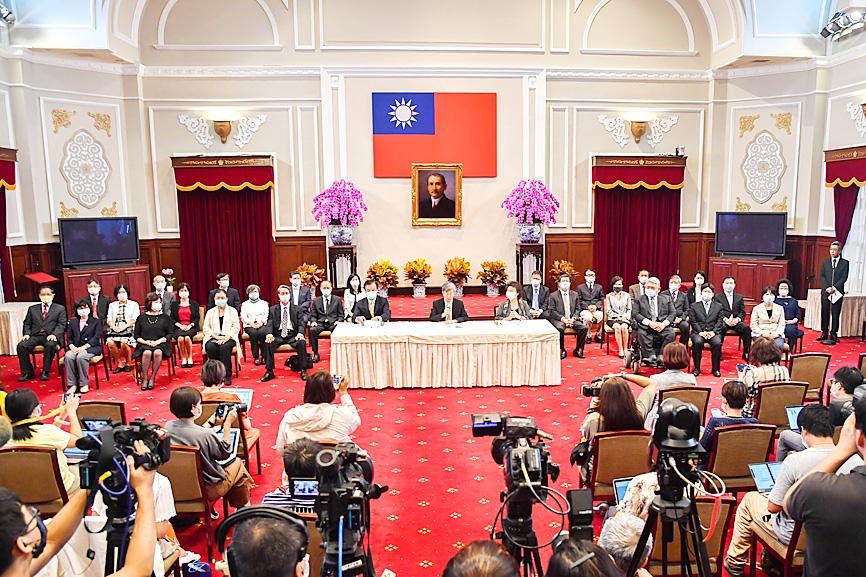The Presidential Office yesterday officially announced its nominations for the Control Yuan, with former Presidential Office secretary-general Chen Chu (陳菊) to head the nation’s top government watchdog and its newly established National Human Rights Commission.
At a news conference at the Presidential Office, Chen announced that she would resign from the Democratic Progressive Party (DPP), saying her new job requires her to transcend party lines.
The Presidential Office had planned to hold a news conference on Friday to announce President Tsai Ing-wen’s (蔡英文) nominations, but that was canceled one hour ahead of its scheduled start after the selection of former Taitung County commissioner Justin Huang (黃健庭) of the Chinese Nationalist Party (KMT) as Control Yuan vice president sparked criticism from politicians across party lines.

Photo: CNA
Huang on Saturday declined the nomination, which was followed by another reported nominee, former New Taipei City deputy mayor Chen Shen-hsien (陳伸賢) of the KMT, also turning down an offer amid criticism that he was impeached by the Control Yuan a decade ago.
The two vacancies would be left unfilled until Tsai submits new nominations, Presidential Office Secretary-General Su Jia-chyuan (蘇嘉全) said.
After becoming Control Yuan president, Chen Chu would head the 10-member National Human Rights Commission, which is also to have seven Control Yuan members and two members to be selected from candidates nominated by commission members who are to serve one-year tenures.
Renominated Control Yuan members are Wang Yu-ling (王幼玲), Kao Yung-cheng (高涌誠), Tien Chiu-chin (田秋堇), Jao Yung-ching (趙永清), Tsai Chung-yi (蔡崇義), Lin Sheng-fong (林盛豐) and Wang Mei-yu (王美玉).
New nominees include Chi Hui-jung (紀惠容), a women’s rights advocate; former legislator Wang Jung-chang (王榮璋); Youth Rights and Welfare Secretary-General Yeh Ta-hua (葉大華); Antonio Hong (鴻義章), a member of the Presidential Office’s Indigenous Historical Justice and Transitional Justice Committee; Taipei Deputy Mayor Chen Chin-jun (陳景峻); Deputy Minister of Health and Welfare Su Li-chung (蘇麗瓊); former deputy minister of education Fan Sun-lu (范巽綠); former DPP legislator Yeh Yi-jin (葉宜津); Supreme Prosecutors’ Office prosecutor Kuo Wen-tung (郭文東); Deputy Auditor-General Wang Li-chen (王麗珍); Ill-gotten Party Assets Settlement Committee deputy-director Shih Chin-fang (施錦芳); National Sun Yat-sen University professor Lin Wen-cheng (林文程); Shih Hsin University professor Lai Ting-ming (賴鼎銘); National Taiwan University College of Medicine professor Hsiao Tsu-yu (蕭自佑); Lai Chen-chang (賴振昌), an accountant; Lin Yu-jung (林郁容), a doctor; National Dong Hwa University College of Indigenous Studies dean Pasuya Poitsonu; and lawyers Lin Kuo-ming (林國明) and Chang Chu-fang (張菊芳).
The Control Yuan is the government branch responsible for investigating and disciplining public servants and agencies. It consists of 29 members appointed by the president and approved by the Legislative Yuan every six years.
The nominations would be sent to the legislature for review and confirmation at an extraordinary legislative session from Monday next week to July 22.
The term of incumbent Control Yuan members ends on July 31 and the newly nominated members would assume their duties from Aug. 1, Su Jia-chyuan said.

POSITIVE DEVELOPMENT: Japan and the US are expected to hold in-depth discussions on Taiwan-related issues during the meeting next month, Japanese sources said The holding of a Japan-US leaders’ meeting ahead of US President Donald Trump’s visit to China is positive news for Taiwan, former Japan-Taiwan Exchange Association representative Hiroyasu Izumi said yesterday. After the Liberal Democratic Party’s landslide victory in Japan’s House of Representatives election, Japanese Prime Minister Sanae Takaichi is scheduled to visit the US next month, where she is to meet with Trump ahead of the US president’s planned visit to China from March 31 to April 2 for a meeting with Chinese President Xi Jinping (習近平). Japan and the US are expected to hold in-depth discussions on Taiwan-related issues during the

‘LIKE-MINDED PARTNER’: Tako van Popta said it would be inappropriate to delay signing the deal with Taiwan because of China, adding he would promote the issue Canadian senators have stressed Taiwan’s importance for international trade and expressed enthusiasm for ensuring the Taiwan-Canada trade cooperation framework agreement is implemented this year. Representative to Canada Harry Tseng (曾厚仁) in an interview with the Central News Agency (CNA) said he was increasingly uneasy about Ottawa’s delays in signing the agreement, especially as Ottawa has warmed toward Beijing. There are “no negotiations left. Not only [is it] initialed, we have three versions of the text ready: English, French and Mandarin,” Tseng said. “That tells you how close we are to the final signature.” Tseng said that he hoped Canadian Prime Minister Mark Carney

President William Lai (賴清德) yesterday bestowed one of Taiwan’s highest honors on Saint Vincent and the Grenadines (SVG) Ambassador Andrea Clare Bowman in recognition of her contributions to bilateral ties. “By conferring the Order of Brilliant Star with Grand Cordon on Ambassador Bowman today, I want to sincerely thank her, on behalf of the Taiwanese people, for her outstanding contribution to deepening diplomatic ties between Taiwan and SVG,” Lai said at a ceremony held at the Presidential Office in Taipei. He noted that Bowman became SVG’s first ambassador to Taiwan in 2019 and

A man walks past elementary school artworks at the Taipei Lantern Festival in Ximen District yesterday, the first day of the event. The festival is to run from 5pm to 10pm through March 15.